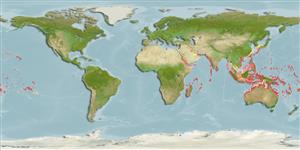Gastropoda |
Littorinimorpha |
Strombidae
Environment: milieu / climate zone / depth range / distribution range
Ecology
Reef-associated; depth range 0 - 30 m (Ref. 349). Tropical; 37°N - 32°S, 29°E - 127°W
Indo-Pacific: from eastern Africa to Sudan, Egypt, Yemen and India, to southeast Asia and Australia, as far east to Pitcairn Islands and north to Hawaii and Japan. Tropical to subtropical.
Length at first maturity / Size / Weight / Age
Maturity: Lm ? range ? - ? cm Max length : 43.0 cm SHL male/unsexed; (Ref. 349); common length : 28.0 cm SHL male/unsexed; (Ref. 349)
Actively collected by native populations for food, by hand at low tide on the reefs, or by diving. In spite of its weight and considerable size, the shell is favored, especially by tourists, due to the beauty of its heavily glazed aperture (Ref. 349). Found in shallow lagoons to the outer edge of reefs. Shell of old specimens often worn and encrusted with calcareous algae, vermetid snails, and tubes of polychaete worms (Ref. 349). Members of the genus Lambis are specialized herbivores, feeding on macroscopic or unicellular algae and algal detritus (Ref. 107011).
Life cycle and mating behavior
Maturity | Reproduction | Spawning | Eggs | Fecundity | Larvae
Members of the order Neotaenioglossa are mostly gonochoric and broadcast spawners. Life cycle: Embryos develop into planktonic trocophore larvae and later into juvenile veligers before becoming fully grown adults.
Poutiers, J.M. 1998 Gastropods. p. 363-648. In Carpenter, K. E. and V. H. Niem. 1998. FAO species identification guide for fishery purposes. The living marine resources of the Western Central Pacific. Volume 1. Seaweeds, corals, bivalves, and gastropods. Rome, FAO. (Ref. 349)
IUCN Red List Status
(Ref. 130435: Version 2025-1)
CITES status (Ref. 108899)
Not Evaluated
Not Evaluated
Threat to humans
Harmless
Human uses
Fisheries: commercial
| FishSource | Sea Around Us
Tools
More information
Population dynamicsGrowth
Max. ages / sizes
Length-weight rel.
Length-length rel.
Length-frequencies
Mass conversion
Abundance
Life cycleReproductionMaturityFecunditySpawningEggsEgg developmentLarvae PhysiologyOxygen consumption
Human RelatedStamps, coins, misc.
Internet sources
Estimates based on models
Preferred temperature
(Ref.
115969): 24.8 - 29.3, mean 28.4 (based on 3207 cells).
Fishing Vulnerability
Low to moderate vulnerability (33 of 100).
Price category
Unknown.
Nutrients : Calcium = 126 [75, 177] mg/100g; Iron = 4.79 [1.67, 7.92] mg/100g; Protein = 15.9 [14.8, 16.9] %; Omega3 = 0.331 [0.263, 0.400] g/100g; Selenium = 57.8 [48.5, 67.2] μg/100g; VitaminA = 0 μg/100g; Zinc = 1.97 [0.92, 3.02] mg/100g (wet weight); based on
nutrient studies.
